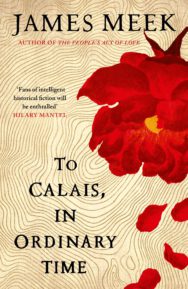‘When travelling towards the pestilence was a theoretical possibility, I had fortitude. Now I may actually go, I am terrified.
Extraordinary times demand extraordinary novels, and Kristian Kerr finds that James Meek has given us just that in his latest, To Calais, In Ordinary Time.
To Calais, In Ordinary Time
By James Meek
Published by Canongate
It’s hard to begin James Meek’s new novel, To Calais, In Ordinary Time, without suspecting it is an allegory for Brexit. The medieval setting, the cutting of a crimson rose in a young Lady’s garden in the opening scene, the defamiliarised, mannered English all heap on top of that channel port and its centuries of baggage. Calais, pace our current Foreign Secretary, has always been Britain’s crucial pinchpoint-gateway to the continent. It is also this novel’s City on the Hill, the destination of its travellers. It is even, in this summer of 1348, an English port, a recently acquired and still precarious toehold in mainland Europe. Were this work purely a Brexit allegory, Calais could be a symbol of a perpetually bellicose attitude towards our continental neighbours, or a kind of common ground, a site of exchange and beacon of confraternity to which the enlightened are flocking. Or it could be both at the same time, because the best allegories work that way.
However, as Meek told his audience at an excellent event at the Edinburgh International Book Festival on publication eve, this isn’t a book about Brexit per se. It was begun in 2013, as a novel about climate change. Meek found his analogy for universal human catastrophe in the Black Death and, in the six years during which he immersed himself in the fourteenth century, he also chronicled a 21st century distracting itself from global crisis by fervent, tribal, identity crises, matters of great import to individuals and nations but of comparatively small difference.
It has become somewhat of a cliché to say that we live in extraordinary times, and this novel shows that, indeed, other times may be similarly extraordinary. I hope that the ‘Ordinary Time’ of the title is a sly joke on this hackneyed phrase, for, taken literally, it refers to the journey taking place in July, a fallow period in the liturgical calendar between Pentecost and advent and so designated as merely ordinary. Still, a time ordinary in its extraordinariness can tend to help historical fiction bridge the gulf of centuries.
While writing To Calais, Meek also published the Orwell-winning Private Island (2014) about the privatisation of our public services and Dreams of Leaving and Remaining (2019) a collection of essays about Brexit drawn from his writing in the London Review of Books. Both Meek’s journalism and this novel exhibit the same knack for portraiture in the true painterly sense. They present people and characters not only as individuals with particular virtues, faults, beliefs or desires, but they also relate their behaviour to broader paradigms, such as myth or social theory. One of the achievements in the complexity of this novel is to depict people getting on with their own short, challenging lives, wrestling betimes with the “big questions” of national and personal identity, freedom, faith and desire, while all-at-once a cataclysm fundamentally alters the foundations of society. So even if this is an allegory of climate change and barely about Brexit at all, as a novel it also does a whole heck of a lot more.
A score of archers is travelling towards Melcombe harbour in Dorset to take ship for Calais. In the Cotswolds they pick up a number of official and unofficial hangers-on: Lady Bernadine, fleeing an arranged marriage and seeking a reunion with the courtly Laurence Haket, also the archers’ captain; Thomas Pitkerro, a Scottish proctor returning to the papal court at Avignon; Will Quate, a bondsman intending to earn his freedom in service as a bowman; and the elusive trio of Hab, Madlen, and Enker, respectively the swineherd, his sister, and a road-going clip-clopping shod boar. The archers, rejoicing in names such as Longfreke, Sweetmouth, and the misnomer Softly, saw action together in France. Their skill secured the English triumph at Crécy but their service has also bonded them in shared knowledge of dark secrets, which will gradually unfurl and shape their destiny.
The unmissable, most ambitious, and most challenging aspect of To Calais is its language. The novel is narrated in three distinct idiolects, each corresponding to a different social class and a distinct way of seeing, feeling, and being in the world. Berna, the daughter of the manor, speaks a French-influenced aristocratic English, the language of power. Thomas writes (letters, mostly) in the Latinate language of the clergy, a language rich in abstractions that could be quite straightforwardly construed. Everyone else speaks a sort of quasi-Chaucerian English peppered with archaisms. It is a conceit designed to show the social divisions that will be erased by the characters’ journey and, across society, by the Black Death itself.
Comedy and pathos arise from early misunderstandings between people who don’t really speak the same language, but the proximity of the journey brings them to an understanding and empathy, as this conversation between Berna and the maid Madlen about fear shows:
‘Are you afraid?’ ‘You mean afeared? Yeah’ ‘Of the pest.’ ‘Yeah.’ ‘You ne appear afraid.’ ‘Appear?’ ‘Seem.’ ‘I ne understand my demoiselle.’ ‘I mayn’t rest. My heart beats furiously and hard. I contemplate and think on my mortality over and over. I see myself covered and ended by darkness. But you seem calm and even, like to you are untroubled and unhurt by the possibility of fatal and deadly malady and sickness.’ ‘Possibility?’ ‘Let’s say “speed” or “hap”. That which may or may not.’ ‘I never had no possibilities, my demoiselle. I have what I have. I mayn’t do nothing about what’s to come.’
Words, concepts, and experience all overlap here. Berna, brought up behind the manor’s walls has only contemplation and fear. Without the word ‘possibility’, Madlen is unaware that people like her might have any.
Linguistically, Meek has pulled off a monumental task. While they remain almost unrelentingly alien, the different voices of To Calais do become mesmerising, especially the rhythm of the common speech, which echoes Chaucer when read aloud. In the earliest stages, while the project is finding its feet, the novel seems to take a tour of medieval storytelling genres in a kind of square-bashing exercise. We have Berna’s self-conscious readings of the Roman de la Rose, Will appears in an allegorical stage play as Venus, a number of confessions are granted to Thomas, there is the history of the battle, and, close to the end, a short, lyrical recap of the novel by Mad, the Welsh archer-bard.
As for the voices, so too for the plot and the characters. Together, the journey and the pestilence slough the encumbrances off the central characters. Not all are spared but the resolutions that come are accompanied by turns of real beauty. In an early conversation Berna and Thomas discuss the crucial aspects of love, and decide that Frankness is an essential component of love. On the open waters of the channel, sailing to a new world in Europe, the surviving characters find a new freedom. The medieval abstract concepts make the resolution of the novel, with its thoroughly modern sense of self-fulfilment, all the clearer and more powerful. In setting out to novelise a time before novels, Meek set himself an extraordinary task. Through language, this book challenges its reader to rewire their brain and adopt a different worldview. This is a deeply humane book, suggesting that our chances of survival in the darkest times are increased by collaboration and fellowship. It is a fascinating, dazzling, provocation towards greater understanding and empathy.
To Calais, In Ordinary Time by James Meek is published by Canongate, priced £18.99
ALSO IN THIS ISSUE

 Enigma
Enigma
‘Balme’s pinch saved countless Allied ships and lives, and brought about the end of numerous U-boats …

 The Boy With The Butterfly Mind
The Boy With The Butterfly Mind
‘Maybe I’ll be able to have an operation to fix my brain so I can concentrate and think like normal …













